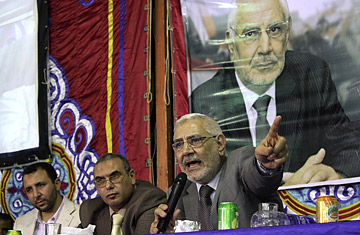
Aboul Fotouh speaks to a crowd in Zefta, Egypt, January 25, 2011.
The thundering wave of democratic change sweeping across the Middle East has empowered Islamists, a development often couched in "told you so" tones by some commentators and politicians. But an Islamist is not an Islamist is not an Islamist. Like most political ideologies, there are shades — sometimes just gray, at other times, more starkly black and white — between the various groups now giving voice to their long-stifled political rights.
This vibrant, boisterous awakening is loudest in Egypt, the Arab world's most populous state and the birthplace of some of Islam's most influential modern thinkers, including Hassan el-Banna, the founder of the Muslim Brotherhood, and Seyyid Qutb, considered by some the father of modern Islamic fundamentalism — and an inspiration to al-Qaeda.
A plethora of Islamist political forces have emerged in Egypt — from hardcore Salafists (who espouse a strict, literalist reading of the Koran) to more moderate, inclusive bodies. Although the revised political party law issued by Egypt's military rulers, the Supreme Council of the Armed Forces (SCAF), prohibits the establishment of parties based on "religion, geography or race," the new organizations have dodged that restriction by forming "civil" groups with Islamic frames of reference, like the Brotherhood's Freedom and Justice Party. To date, SCAF has denied only one licensing application, submitted by the formerly militant group Al-Gamaa al-Islamiya, which waged an insurgency against the Egyptian state for decades until the mid-1990s.
As the political jockeying begins for staggered elections in the lower house of Parliament that kick off on Nov. 28, it's unclear if the various Islamist groups will compete against one other, or coalesce to take on the secular, liberal parties. (A three-round election for the upper house will be held from Jan. 29 to March 11.) The powerful Brotherhood recently said it will vie for 40% of the lower assembly, down from an earlier figure of 50% which was up from the 30% suggested by spokesman Essam el-Erian back in March. (Erian is now the vice-president of Freedom and Justice.)
The party now says it does not want a majority on its own, but hopes the Democratic Coalition it has joined (a loose alliance of more than 30 political groups including the liberal Wafd Party), will take the lion's share of the assembly. Still, while it seeks to win seats in the house, the Brotherhood's own house is exhibiting signs of division, with members splintering away from what was for decades one of the best organized, although subdued, political forces of any shade during Hosni Mubarak's dictatorship.
The Brotherhood's breakaways are mainly disaffected youth. Some are uneasy with their elders' comfortable ties with the ruling military council; others more closely identify themselves with other groups. (For example, there are at least four new parties formed by Salafis.)
Still others, like Mohammad Othman, say the party doesn't represent them any more. Othman, 30, was a member of the party for 13 years, but left it a few months after Mubarak was toppled. He participated in the mammoth demonstrations in the capital's Tahrir Square, but says it soon became clear to him that the Brotherhood wasn't interested in real change. "It has forgotten about the more important concerns of the street, it's too busy creating deals with the ruling military council. I think it has betrayed the revolution," he says. "The Ikhwan [Brothers] talk about reforms, they aren't interested in real change on the Egyptian street." Othman says that many of his friends have also left the party, for similar reasons.
